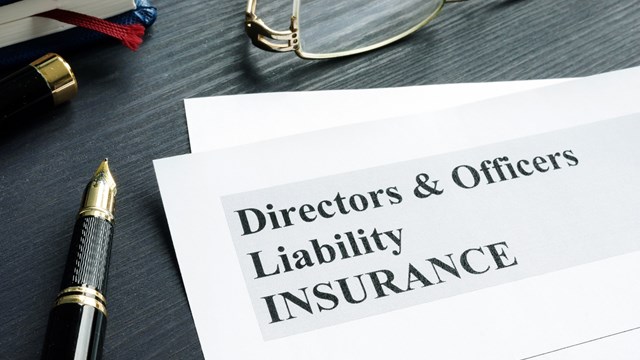
Last year in New Jersey, a former property manager in Freehold Township was accused of embezzling $75,000 from homeowner dues. In a separate case, a woman, her husband and mother were charged with theft from an Aberdeen condo association after misappropriating $995,000 of the association’s money from January 2005 through September 2006, and in Readington, a former community manager of the Whitehouse Village Condominium Association admitted in state Superior Court to pilfering at least $200,000 from the organization.
Fraud and embezzlement in the workplace is on the rise. The Association of Fraud Examiners (ACFE) estimates business losses of $400 billion per year—or about 6% of total annual revenue.
When fraud is discovered in the context of community associations, or any nonprofit, it usually takes shape as embezzlement over many years by a trusted member or employee. Insurance companies that defend nonprofit clients from fraud can be victimized themselves.
“I’ve seen a lot of theft claims in homeowner associations,” says Paul E. Felsen, president of Felsen Insurance Services Inc. in Denville. “And I’ve been doing this for 41 years. One claim I handled was at an HOA in Freehold. A board member had a homeowner association credit card at Home Depot. And she’d go to Home Depot and buy the normal supplies that she was suppose to buy. She bought supplies for the community and some for herself. That’s stealing. By the time she was caught she had stolen $50,000 to $60,000 worth of goods. It wasn’t cash, but in essence it was. This happens a lot, theft of goods. What happened is that their accountant picked up on it and since she was an employee of the property management company she was prosecuted.”
Felsen points out that in the state of New Jersey prosecution is mandatory when employees commit theft or fraud. “If the insurance company is going to pay the loss, they insist that they person be prosecuted because usually part of their sentencing agreement includes that person making restitution,” he says. “So the association gets paid by the insurance company and then the insurance company goes after the person for restitution.”
On the other hand, notes Stephen B. Kotzas, Esq., of Berry, Sahradnik, Kotzas & Benson in Tom’s River, community associations have been known to perpetuate fraud.
“I’ve come across situations where the association was self-managed and one or more of the trustees were self-dealing or taking kick backs from vendors, contractors, suppliers,” says Kotzas. “For example they’d say to a contractor, ‘I’ll give you this contract and you give me a certain percentage,’ or they are simply mismanaging the association.”
“A community association is just like any other company that’s out there,” says Thomas Martin, an attorney with Nowell, Amoroso, Klein and Bierman in Hackensack, “so you’ll find people committing fraud and theft.”
In addition to embezzlement schemes, there are a few fraud-like situations that are specific to a community association setting such as board members pilfering reserve funds for personal use or property management companies misappropriating association’s money.
Temptations and Frustrations
Fraud cases that occur in the context of community associations can be downright sneaky. Kotzas describes a local case involving a property manager engaging in fraudulent activity.
“There was this one case that happened locally, I didn’t handle it personally but a lot of people were buzzing about it,” says Kotzas. “A property manager set up dummy corporations, some even had logos and business cards, and inferred to the association that these were independent contractors that he had hired to perform work but they were actually controlled by him. He was paying himself to do the work. That’s how he got caught—he wasn’t doing the work at all or he was doing it badly. I think he’s going to jail.”
A faltering economy coupled with a foreclosure crisis can lead desperate people to do desperate things, even trusted board members and property managers.
I had this situation at a community in North Plainfield where a board member was filing phony purchase orders,” recalls Felsen. “She was supposed to buy ten new chairs for the pool, so she bought twenty new chairs. She took five for herself and sold the other five. In tough economic times people do really stupid things.”
In many cases, especially with smaller associations you many find a board comprised of volunteer neighbors with the common goal of keeping costs down but Martin cautions against it.
“Lots of people are trying to keep costs down but I would say don’t try to self-manage,” says Martin. “You don’t want to do that because the money you are paying a managing agent you have a right to rely on their expertise. And the same goes for a lawyer or an accountant. If you are a small community there are managing agents that specialize in smaller community associations. It’s always best to hire professionals. For example one thing that’s in master deed bylaws is that an annual audit is required, if an association is self managing they may try to bypass that in order to save on the expense of hiring a professional CPA. Flying blind without an annual audit to save a dollar or two is only going to come back and hurt you. The more things become casual the more there’s a greater risk to lose an institutional memory of what happened. It’s penny wise and pound foolish to self-manage.”
Insurance Has its Limits
Board members need to understand all aspects of their insurance package--what each element can or cannot do.
Directors and managers assume that insurance is the first line of defense to provide protection from charges of fraud, although Felsen points out that in most cases associations have a crime policy and an employee dishonesty policy but sometimes they do not.
“The definition of employee includes the property manager,” says Felsen. “Even though the property manager is not an employee of the association they are an employee of the management company.”
Many insurance policies are capped at $100,000, so home owner associations will need separate policies to insure for more than that.
Insurance professionals agree that many people confuse Directors and liabilities insurance (D&O) with fidelity coverage.
“If I’m a board member and I make a mistake—I’m human—I can make a mistake, that’s negligence, that’s what insurance coverage is for,” says Kotzas. “If I commit a crime, if I write a check to myself and go gamble it away, there’s never insurance for intentional actions. A fidelity bond is for someone taking money from you in a position of trust. It would have to be someone who handles money for you in the first place, not a third or fourth party.”
When insurance companies are victimized, fraud can take the form of misrepresentation. For example if a condominium is described as having a sprinkler system, on the policy but not in reality or if builders fudge some numbers and think it will never catch up with them, but the insurer won’t pay up [for an insured event] if there was misrepresentation on the application.
‘Trust’ Can Make Nonprofits Vulnerable
Kotzas, Felsen and Martin all agree that most crimes are committed against homeowner associations and property management companies by trusted, long-term employees or board members, so it’s important to be aware of red flags of mismanagement in a condo or HOA setting.
“If a board does not have an annual audit, that’s a red flag,” says Martin. “The annual audit protects all members of the board and if a board member doesn’t want one, you should ask yourself why. Another red flag is when a contractor or vendor won’t give you an insurance certificate. You try to find out as much about the contractor as possible including personal information about the principals of the company. I don’t know if they’ll release it, but you have to be able to find these people if they default and disappear.”
In some of the bigger associations, the unit owners write checks for their monthly dues, which go to the management company, which deposits them and then [management] writes checks to vendors. It’s usually a bad apple who gets to control different levels [of finance] collecting checks and then writing checks. If someone is skimming $500 each month for services no one really scrutinizes… then things start small and get bigger over years and years.
In most cases fraud and theft in nonprofit organizations are usually traceable because of paper trails. The most common scenario is a rogue bookkeeper who has the opportunity to steal.
Years can go by as fraud or theft continues. Often, the fraudulent activity is discovered by accident.
“Fraud can be discovered in various ways,” says Kotzas. “You may have a new election and the new board members come in and scrutinize things. Maybe it’s been a while since there was as audit, so they go out and hire an auditing company and they find that money is missing. That’s frequently how it’s found. If I get hired to work with an association the first thing I look at is—how big the budget is? How much money actually went toward legitimate expenses, after paying for snow plowing and property taxes and everything else you have to pay for and what happened to the left over money—does it add up?”
Recent case law indicates that there is culpability for not warning someone about criminal actions and knowingly holding back information regarding criminal intent. Firms should not attempt to hide relevant information about crime.
Keep in mind the term ‘con man’ derives from ‘confidence man’ because it’s someone who has gained the trust of his or her victims.
Marie Auger is a Massachusetts freelance writer and a frequent contributor to The New Jersey Cooperator. Staff Writer Christy Smith-Sloman contributed to this article.






Leave a Comment